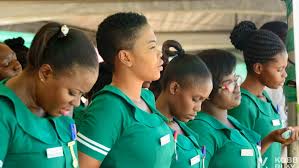Nurses and Midwives Suspend Strike Following Public Concerns and Parliamentary Intervention
Dr. David Tenkorang-Twum, General Secretary of the Ghana Registered Nurses and Midwives Association (GRNMA), has stated that the association decided to suspend its strike due to concerns raised by the public and the intervention of the parliamentary select committee on health.
Speaking on TV3 on Saturday, June 14, he revealed that prominent Ghanaians had reached out to express their worries about the impact of the strike.
“We had picked some signals, the cry of the people of Ghana, quite prominent members of the society had approached us. The Select Committee on Health decided we should appear before them and put our concerns.
“We had to listen to the cry of the people and of course, the representatives of the people,” he said.
A statement issued earlier announcing the suspension of the strike on Friday, June 13, and signed by GRNMA President Perpetual Ofori-Ampofo, emphasized that nurses and midwives do not take pleasure in seeing their patients suffer. However, they also need a system that adequately supports them to provide care.
The GRNMA initiated a nationwide strike over the non-implementation of the 2024 Collective Bargaining Agreement, which was signed with the government a year ago. The protest began with nurses and midwives wearing red armbands and headbands from June 2 to 3, followed by the withdrawal of Outpatient Department (OPD) services from June 4 to 8, 2025.
The National Labour Commission (NLC) declared the strike illegal and secured a court injunction, directing the GRNMA to return to negotiations with the Ministry of Health.
More than 128,000 nurses and midwives across Ghana had announced the industrial action on May 28, 2025, citing delays in implementing new conditions of service agreed upon in 2024.
The GRNMA had initially maintained that its members would only return to work once the new conditions of service were fully implemented.
However, the statement announcing the suspension of the strike clarified the association’s position:
“Our demand from our employer was simply to have the Collective Agreement of Ghanaian nurses and midwives, which was signed in May 2024, duly implemented without any further delay.
“We are nurses and midwives trained to provide essential health services to the Ghanaian population, and matters affecting us which are brought formally to the attention of the employer must be treated with the urgency it deserves and in good faith.”
